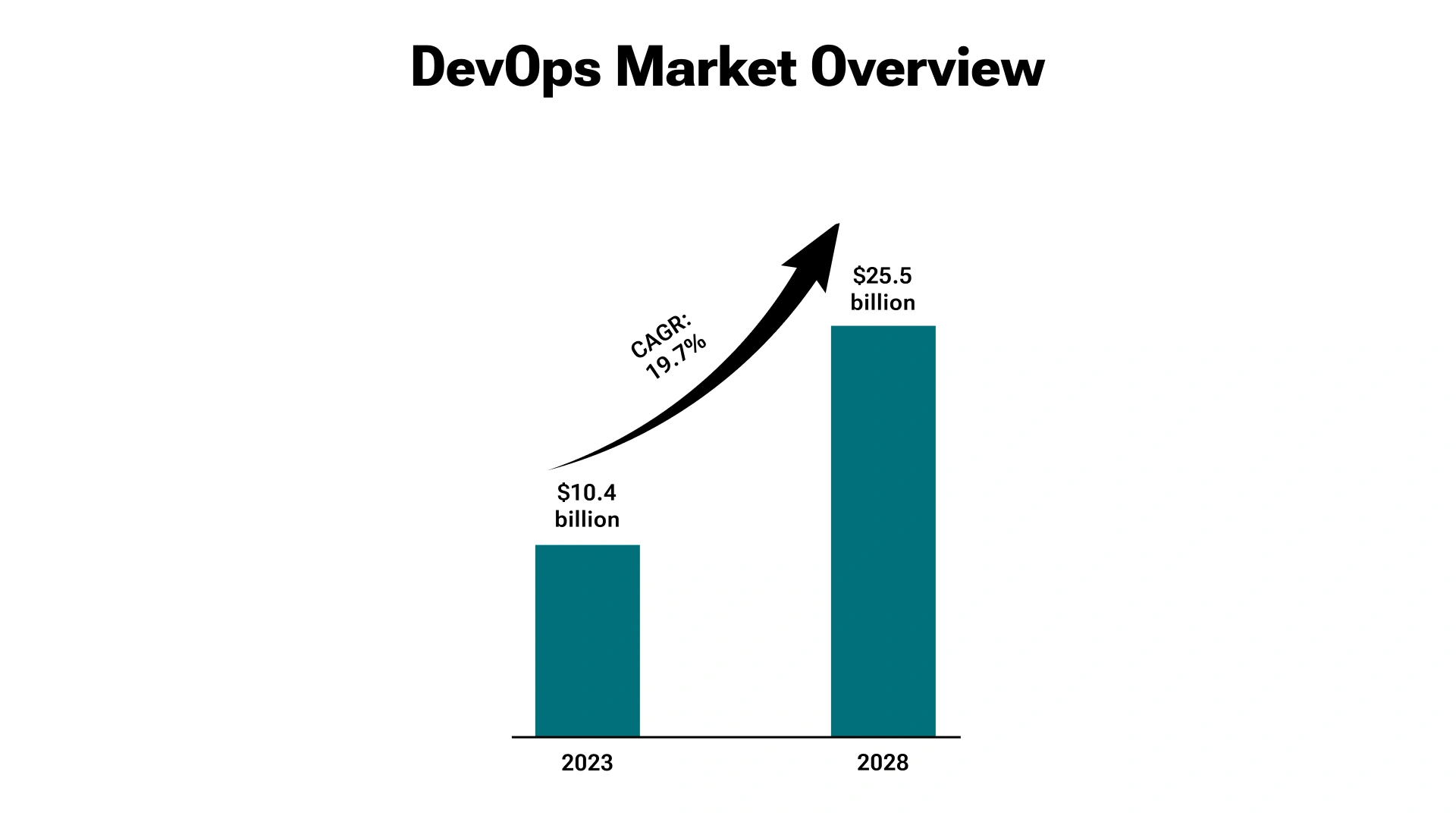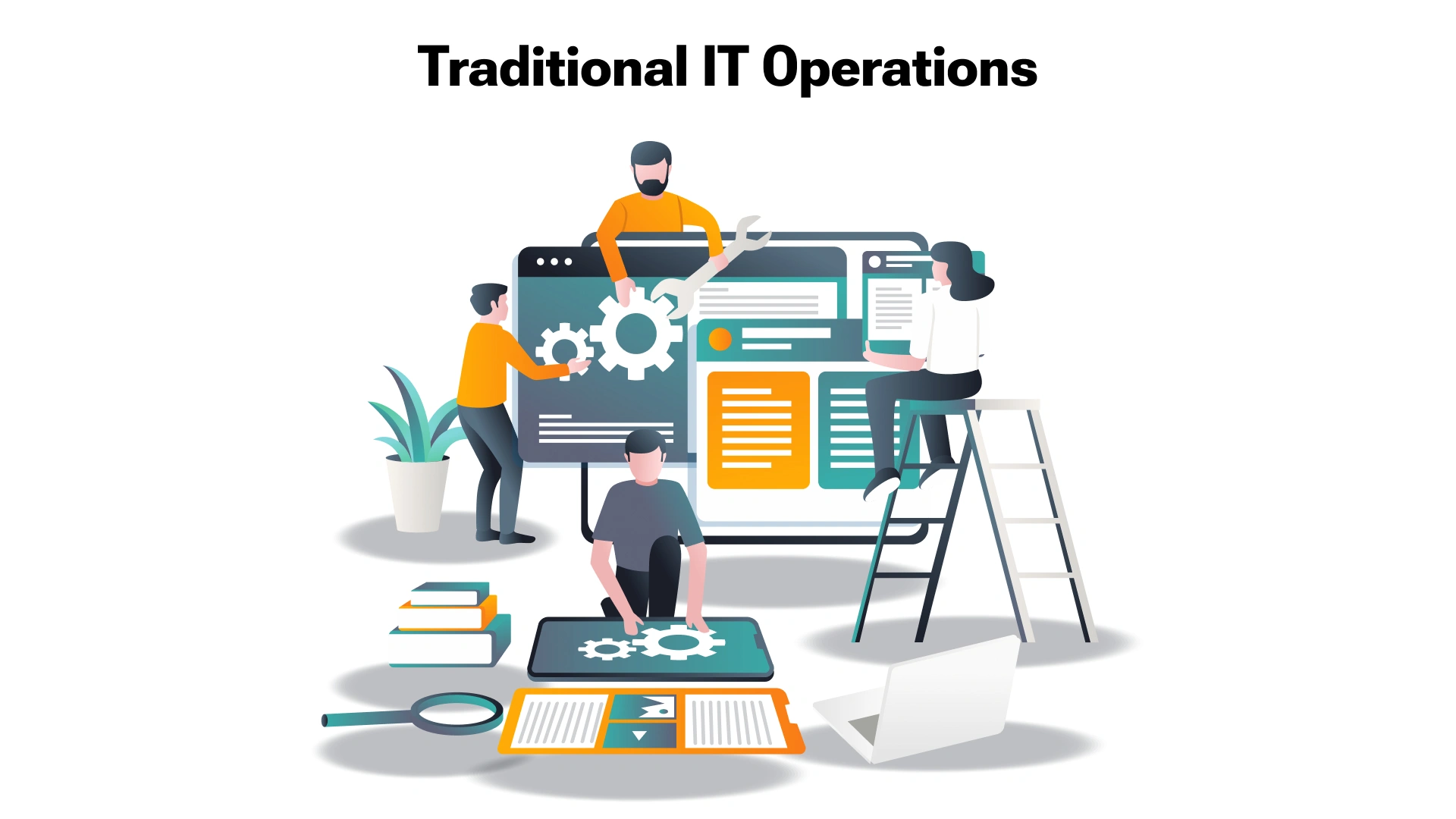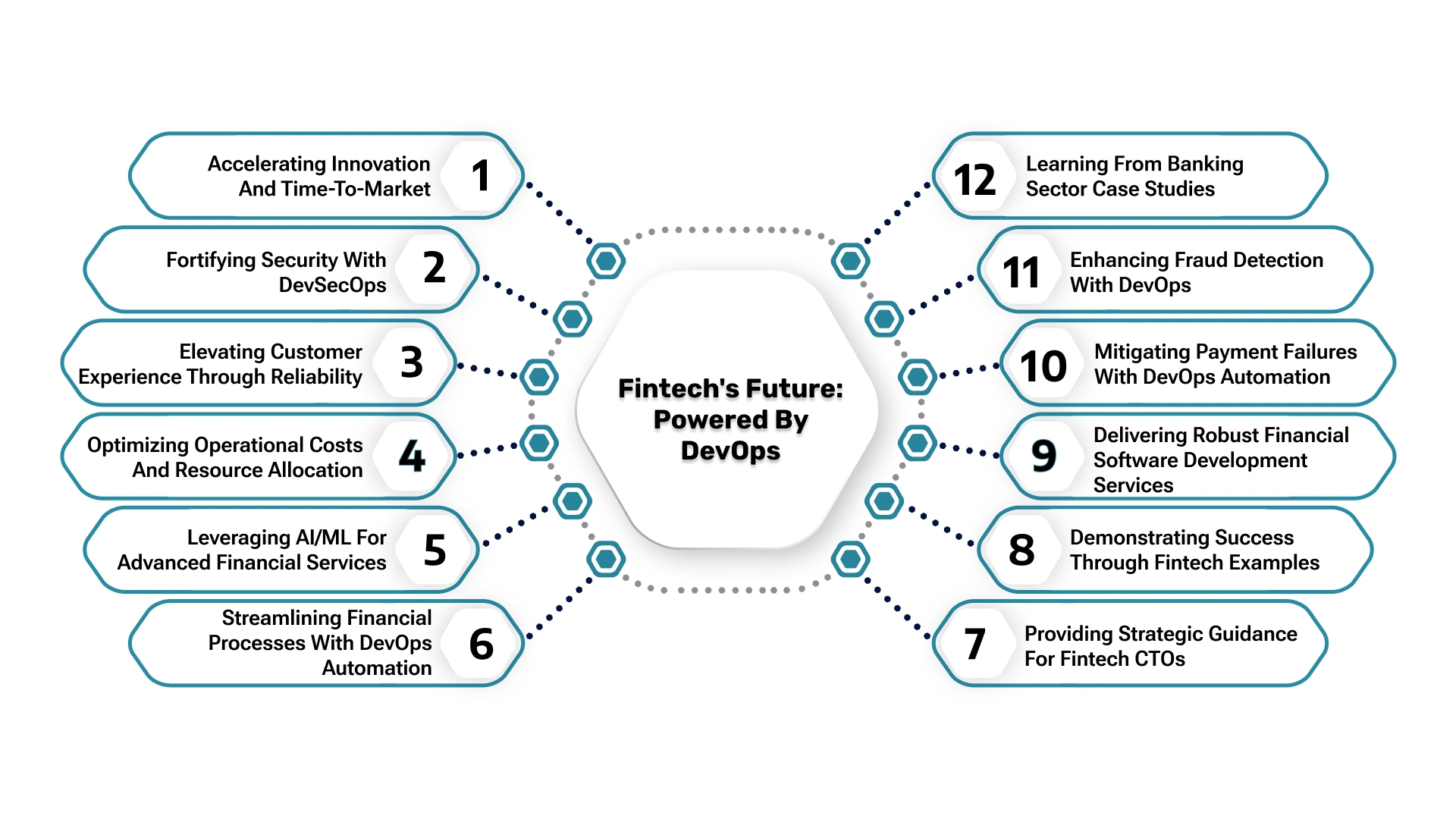The financial technology sector is a crucible of innovation, where speed, security, and reliability are paramount. In this dynamic landscape, the choice between DevOps and traditional IT operations can be the difference between market leadership and obsolescence.

These statistics underscore the tangible benefits that DevOps brings to the table. For Fintech CTOs and startup owners navigating this complex terrain, staying informed about the latest DevOps trends and statistics is not just prudent; it's essential for survival.
This blog aims to dissect the critical differences between DevOps vs. traditional IT operations, demonstrating why devops for fintech companies is no longer a luxury but a fundamental necessity.
What is DevOps IT Operations?
DevOps, a fusion of "development" and "operations," represents a paradigm shift in software development and deployment. It's more than just a set of tools; it's a cultural philosophy that fosters collaboration, automation, and continuous improvement. At its core, DevOps breaks down the traditional silos between development and operations teams, creating a unified workflow.

This approach emphasizes automation through continuous integration (CI) and continuous delivery (CD) pipelines, enabling rapid and reliable software releases. In DevOps for fintech, this translates to the ability to quickly deploy innovative financial services, respond swiftly to security threats, and adapt to evolving regulatory requirements. It's about building a dynamic and responsive IT infrastructure to meet the financial sector's relentless demands.
Advantages of DevOps IT Operations: The Fintech Edge
The benefits of devops are particularly pronounced in the high-stakes world of Fintech.
- Accelerated Time-to-Market: DevOps enables Fintech companies to rapidly iterate and deploy new features, giving them a competitive edge. This agility is crucial in a market where speed is often the deciding factor.
- Enhanced Software Quality: Continuous testing and integration minimize bugs and errors, leading to more reliable and secure financial applications. This is critical for maintaining customer trust and ensuring regulatory compliance.
- Seamless Collaboration: By breaking down silos, DevOps fosters a culture of collaboration and shared responsibility, improving communication and efficiency.
- Increased Operational Efficiency: Automating repetitive tasks frees up valuable resources, allowing teams to focus on strategic initiatives and innovation.
- Scalability and Reliability: Infrastructure as Code for Banking allows for the rapid scaling of systems to meet fluctuating demand, ensuring high availability and reliability.
- Robust Security (DevSecOps): Integrating security practices throughout the development lifecycle, known as DevSecOps for financial institutions, helps mitigate risks and protect sensitive financial data.
- Minimized Payment Failures: Reduce Payment Failures with DevOps Automation by improving the reliability and efficiency of payment systems, enhancing customer trust and satisfaction.
- Advanced Fraud Detection: Fraud Detection with DevOps enables real-time monitoring and rapid deployment of fraud detection algorithms, protecting against financial losses.
Disadvantages of DevOps IT Operations: Navigating the Challenges
While the pros of devops are compelling, it's essential to acknowledge the potential challenges.
- Cultural Transformation: Transitioning to DevOps requires a significant cultural shift, which can be challenging for organizations accustomed to traditional workflows.
- Initial Investment: Implementing DevOps tools and providing training can involve substantial upfront costs.
- Resistance to Change: Some team members may resist the change, leading to friction and delays.
- Complexity Management: Managing a highly automated and integrated environment requires specialized skills and expertise.
- Security Vulnerabilities: Automation can introduce new security risks if not implemented correctly.
What is Traditional IT Operations?
Traditional IT operations are characterized by a clear division of labor, with development and operations teams working independently. Development focuses on coding and feature delivery, while operations handle deployment, maintenance, and support. This model relies heavily on manual processes, leading to lengthy release cycles and limited collaboration. Handoffs occur at specific stages, often resulting in a "throw it over the wall" mentality, hindering rapid iteration and responsiveness.

This linear, sequential approach struggles to keep pace with the agility required in the Fintech industry. Traditional IT's inherent delays and inflexibility can hinder a company's ability to respond quickly to market changes, security threats, or regulatory updates. This reactive approach to problem-solving, rather than proactive monitoring and prevention, often results in more extended downtimes and increased security vulnerabilities, ultimately impacting customer satisfaction and competitive advantage.
Advantages of Traditional IT Operations: The Familiar Comfort and Structured Stability
Traditional IT offers distinct advantages in environments prioritizing stability and predictability over rapid change. Such as:-
- Established Processes: Well-defined procedures ensure consistent outcomes and minimize unexpected deviations. Formal change management processes reduce the risk of disruptive system alterations, which is crucial for compliance.
- Clear Roles and Responsibilities: Explicitly defined roles create a clear hierarchy and accountability, minimizing overlap and confusion. Incident response procedures are delineated for swift problem resolution.
- Familiarity: IT professionals are often well-versed in traditional practices, reducing the need for extensive retraining. This familiarity contributes to workforce stability and simplifies legacy system maintenance.
- Strong Documentation and Audit Trails: Meticulous record-keeping facilitates compliance and issue tracking. Detailed audit trails provide a clear history of system activities, aiding in problem resolution and legal compliance.
- Predictable Budgeting: Traditional IT often operates on predictable budget cycles, simplifying financial planning. Predictable hardware lifecycles allow for long-term budget management.
- Stronger Separation of Duties: A clear separation of duties enhances security and reduces risk by preventing excessive individual control, which is especially important in finance.
- Emphasis on Stability and Uptime: Traditional IT prioritizes system reliability, which is crucial for mission-critical applications. Change windows are carefully planned to minimize user impact.
- Hardware lifecycle predictability: Predictable replacement schedules allow for better budget management and prevent unexpected hardware failures, leading to more stable systems.
- Reduced need for constant retraining: Staff familiarity with existing systems reduces retraining costs and time, ensuring smoother operations.
- Easier to maintain legacy systems: Older systems function with minimal changes in a traditional environment, proving a more cost-effective solution.
Disadvantages of Traditional IT Operations: The Bottlenecks
However, the cons of traditional it operations are increasingly becoming a significant impediment for Fintech companies.
- Slow Release Cycles: Manual processes and limited collaboration lead to lengthy release cycles, hindering innovation and responsiveness.
- Increased Risk of Errors: Manual deployments and configurations increase the risk of human errors and system failures.
- Poor Collaboration: Siloed teams result in poor communication and collaboration, leading to inefficiencies and delays.
- Limited Scalability: Traditional infrastructure often struggles to scale with the rapid growth of Fintech applications.
- Higher Operational Costs: Manual processes and longer downtimes increase operational costs.
- Inability to Adapt: Fintech requires rapid iterations, and traditional IT is slow to change, risking obsolescence.
DevOps vs. Traditional IT Operations: 10 Key Differences
The difference between DevOps and traditional IT operations is vast, impacting every software development and deployment facet. To truly understand why Fintech companies must embrace DevOps, let's delve deeper into these 10 crucial distinctions:

1. Collaboration: The Heart of DevOps vs. Siloed Isolation:
- DevOps: Collaboration transcends mere communication; it's about shared ownership and responsibility. Teams are cross-functional, with developers, operations, and security working unison. Tools like Slack, Microsoft Teams, and Jira facilitate real-time communication and knowledge sharing. This culture of collaboration fosters a "we build it, we run it" mentality, reducing handoff friction and accelerating problem resolution.
- Traditional IT: Siloed teams operate in isolation, with limited communication and handoffs between development and operations. This separation often leads to "throwing code over the wall" scenarios, where developers are disconnected from the operational realities of their software. This isolation results in delays, miscommunication, and a lack of shared accountability.
2. Automation: The Engine of Efficiency vs. Manual Bottlenecks:
- DevOps: Automation permeates every stage of the software lifecycle, from code integration and testing (CI) to deployment and infrastructure provisioning (CD). Tools like Jenkins, GitLab CI/CD, Ansible, and Terraform enable automated pipelines, reducing manual errors and accelerating release cycles. Automation in Fintech is critical to deploy security patches and adapt rapidly to regulatory changes.
- Traditional IT: Manual processes are the norm, leading to slow, error-prone deployments and increased operational overhead. Manual configuration management and deployments result in inconsistencies and delays, hindering agility and scalability.
3. Release Cycles: Continuous Delivery vs. Infrequent Releases:
- DevOps: Continuous integration and continuous delivery (CI/CD) enable frequent, minor releases, allowing for rapid iteration and feedback. This approach minimizes the risk of large, disruptive deployments and allows for quick responses to customer needs. In Fintech, this speed is vital for deploying new features and security updates.
- Traditional IT: Releases are typically large, infrequent, and risky. Changes are batched and deployed in periodic releases, often leading to significant downtime and disruption. This model hampers innovation and makes it difficult to respond to market changes.
4. Feedback Loops: Continuous Improvement vs. Delayed Insights:
- DevOps: Continuous monitoring and feedback are integral to DevOps. Tools like Prometheus, Grafana, and ELK Stack provide real-time insights into system performance and user behavior. Feedback identifies and addresses issues quickly, leading to continuous improvement.
- Traditional IT: Feedback loops are often delayed and reactive. Monitoring is limited, and issues are typically addressed only after they cause significant problems. This lack of proactive monitoring and feedback hinders improving software quality and reliability.
5. Scalability: Dynamic Infrastructure vs. Static Limitations:
- DevOps: Infrastructure as Code (IaC) allows for the dynamic provisioning and scaling of infrastructure based on demand. Cloud platforms like AWS, Azure, and Google Cloud provide the flexibility and scalability required to handle fluctuating workloads. In Fintech, this dynamic scalability is necessary to handle large transaction volumes.
- Traditional IT: Infrastructure is typically static and difficult to scale. Adding or removing resources requires manual configuration and deployment, leading to delays and potential downtime. This rigidity limits the ability to respond to changing business needs.
6. Security: Integrated Security (DevSecOps) vs. Post-Deployment Patching:
- DevOps: Security is integrated throughout the development lifecycle (DevSecOps), with security testing and vulnerability scanning incorporated into CI/CD pipelines. This proactive approach helps identify and mitigate security risks early in development, which is critical for FinTech.
- Traditional IT: Security is often an afterthought, addressed only after deployment. This reactive approach increases the risk of security vulnerabilities and makes it more challenging to respond to threats, creating a larger attack surface.
7. Flexibility: Adaptability vs. Rigid Processes:
- DevOps: DevOps is inherently flexible, allowing teams to adapt quickly to changing requirements and market conditions. This agility is crucial in the dynamic Fintech landscape, where regulations and market trends shift rapidly.
- Traditional IT: Rigid processes and procedures make it challenging to adapt to change. This lack of flexibility can hinder innovation and make it difficult to respond to evolving business needs.
8. Risk Management: Proactive Mitigation vs. Reactive Response:
- DevOps: DevOps emphasizes proactive risk management, with continuous monitoring and automated testing to identify and mitigate potential issues before they cause problems. This proactive approach helps reduce downtime and improve system reliability.
- Traditional IT: Risk management is often reactive, with issues addressed only after they cause significant disruption. This reactive approach increases the risk of downtime and data loss.
9. Cost Efficiency: Automation Savings vs. Operational Overhead:
- DevOps: Automation and efficient processes lead to significant cost savings. Reducing manual errors, downtime, and operational overhead contributes to a more efficient and cost-effective IT operation.
- Traditional IT: Manual processes, lengthy downtimes, and inefficient resource utilization contribute to higher operational costs, which leads to a less cost-effective model.
10. Customer Satisfaction: Rapid Improvements vs. Delayed Resolutions:
- DevOps: Rapid releases, improved software quality, and quick problem resolution increase customer satisfaction. Continuous feedback loops mean the client's needs are rapidly and constantly integrated into the products.
- Traditional IT: Delayed releases, frequent issues, and slow problem resolution lead to lower customer satisfaction
The ten key differences outlined between DevOps and traditional IT operations highlight a fundamental shift in how technology supports business objectives. DevOps fosters an environment of collaboration, automation, and continuous improvement, crucial for the rapid innovation demanded by the Fintech sector. With its siloed structures and manual processes, traditional IT struggles to keep pace, leading to inefficiencies, increased risks, and diminished customer satisfaction.
Ultimately, the choice between DevOps and traditional IT is not simply a matter of preference but a strategic decision that impacts a Fintech company's ability to compete and thrive. While traditional IT may offer stability in specific contexts, DevOps's agility, security, and efficiency are essential for navigating the dynamic Fintech landscape.
DevOps vs. Traditional IT: A Detailed Comparison Table
To solidify the core differences and highlight the strategic advantages of DevOps for Fintech companies, consider this comprehensive comparison:
| Feature | DevOps | Traditional IT |
| Collaboration | High: Cross-functional teams, shared ownership, real-time communication | Low: Siloed teams, limited communication, handoffs |
| Automation | High: CI/CD pipelines, Infrastructure as Code, automated testing | Low: Manual processes, manual deployments, manual configurations |
| Release Frequency | High: Frequent, small releases, continuous delivery | Low: Infrequent, large releases, batched deployments |
| Feedback Loops | Continuous: Real-time monitoring, continuous feedback, proactive problem resolution | Limited: Delayed feedback, reactive problem solving, limited monitoring |
| Scalability | High: Dynamic infrastructure provisioning, cloud-based scaling | Low: Static infrastructure, manual scaling, limited flexibility |
| Security | Integrated (DevSecOps): Security integrated into every phase of SDLC | Post-Deployment: security patching is done after deployment. |
| Flexibility | High: Agile, adaptable to change, quick iterations | Low: Rigid processes, slow to adapt, limited flexibility |
| Risk Management | Proactive: Continuous monitoring, automated testing, preventive measures | Reactive: Issue resolution after problems occur |
| Cost Efficiency | High: Automation, efficient resource utilization, reduced downtime | Low: Manual processes, high operational overhead, frequent disruptions |
| Customer Satisfaction | High: Fast release of updates, rapid bug fixes, high up time. | Low: slow updates, long bug fix resolution times, and potential downtime |
Fintech's DevOps Imperative: Why Ignoring It Is Not an Option
For Fintech companies, embracing DevOps is not a matter of choice but a strategic imperative. The challenges of IT operations in fintech are unique and demanding. Fintech applications must be highly secure, scalable, and reliable to handle sensitive financial data and transactions.
Moreover, the rapid pace of innovation in the Fintech sector requires companies to be agile and responsive to market changes. Ignoring DevOps can lead to:
- Competitive Disadvantage: Companies using DevOps will release products faster and more frequently.
- Increased Security Risks: Outdated IT practices are more vulnerable to cyberattacks.
- Higher Operational Costs: Inefficient processes and downtime lead to higher costs.
- Decreased Customer Trust: Frequent outages and poor performance erode customer confidence.
- Regulatory non-compliance: Fintech must adapt quickly to regulatory changes.
The Critical Role of DevOps in Fintech's Future
In the rapidly evolving Fintech landscape, DevOps is not merely a toolset; it's a strategic imperative that shapes the future of financial services. The multifaceted role of DevOps in Fintech applications and companies is essential for driving innovation, enhancing security, and ensuring sustained success.

- Accelerating Innovation and Time-to-Market: DevOps empowers Fintech companies to rapidly prototype, test, and deploy new financial services, enabling them to stay ahead of the competition. Continuous integration and continuous delivery (CI/CD) pipelines facilitate quick iterations and frequent releases, allowing faster responses to market demands and customer needs.
- Fortifying Security with DevSecOps: Security is paramount in an industry dealing with highly sensitive financial data. DevSecOps for financial institutions integrate security practices throughout the software development lifecycle, ensuring regulatory compliance and safeguarding against cyber threats. Automated security testing and vulnerability scanning within CI/CD pipelines provide continuous protection.
- Elevating Customer Experience through Reliability: Faster and more reliable applications are crucial for enhancing customer satisfaction. DevOps practices, including continuous monitoring and automated rollback mechanisms, minimize downtime and ensure seamless transactions, bolstering customer trust and loyalty.
- Optimizing Operational Costs and Resource Allocation: Automating repetitive tasks and efficiently utilizing resources significantly reduce operational costs. Infrastructure as Code (IaC) enables dynamic scaling, ensuring that resources are allocated optimally based on demand, leading to cost savings and increased efficiency.
- Leveraging AI/ML for Advanced Financial Services: Integrating AI and ML into DevOps facilitates real-time fraud detection, personalized financial services, and predictive analytics. Automated deployment of AI/ML models enables rapid adaptation to evolving fraud patterns and customer preferences.
- Streamlining Financial Processes with DevOps Automation: DevOps automation streamlines critical processes in financial services, reducing manual errors and enhancing operational efficiency. This automation ensures faster and more accurate financial transactions, minimizes risks and improves overall performance.
- Providing Strategic Guidance for Fintech CTOs: A comprehensive DevOps guide for Fintech CTOs offers a framework for successful DevOps implementation, covering best practices, tool selection, and cultural transformation. This guidance ensures that Fintech companies can effectively leverage DevOps to achieve their business objectives.
- Demonstrating Success through Fintech Examples: Real-world examples of DevOps in Fintech showcase successful implementations and best practices, providing valuable insights and inspiration for other companies. These case studies highlight the tangible benefits of DevOps in improving speed, security, and efficiency.
- Delivering Robust Financial Software Development Services: Specialized financial software development services provide expertise in building secure and scalable financial applications. These services ensure that Fintech companies have access to the necessary skills and resources to develop high-quality software.
- Mitigating Payment Failures with DevOps Automation: DevOps minimizes payment failures by implementing robust monitoring and automated rollback mechanisms, ensuring seamless transactions and maintaining customer trust.
- Enhancing Fraud Detection with DevOps: Real-time data analysis and rapid deployment of updated fraud detection algorithms enabled by DevOps help prevent financial fraud and protect sensitive customer data.
- Learning from Banking Sector Case Studies: Analyzing successful DevOps implementations within the banking sector provides valuable insights and best practices, enabling Fintech companies to learn from proven strategies and avoid common pitfalls.
Accelerate Your Development with VLink's DevOps Services
In the fiercely competitive Fintech arena, speed and reliability are non-negotiable. VLink's specialized DevOps development services are designed to empower your Fintech company to achieve unprecedented development velocity and operational excellence. We understand the unique challenges faced by the financial sector, from stringent security requirements to rapid regulatory changes, and our tailored solutions address these complexities head-on.
Our experienced DevOps engineers work closely with your teams to implement robust CI/CD pipelines, automate infrastructure provisioning, and integrate DevSecOps practices. By streamlining your software development lifecycle, we help you reduce time-to-market, minimize errors, and enhance the overall quality of your financial applications. VLink's DevOps services provide a scalable and secure foundation, allowing you to focus on innovation and customer satisfaction.
Unlock the full potential of your Fintech development with VLink's DevOps services. We help you accelerate innovation, enhance security, and achieve sustainable growth in the ever-evolving financial landscape.
Conclusion: Embracing DevOps for Fintech's Future
In the dynamic Fintech landscape, adopting DevOps is no longer optional but essential. The precise cost advantages, enhanced security, and faster innovation make it a strategic imperative. Traditional IT's limitations hinder the agility required to thrive.
For Fintech leaders, understanding and implementing DevOps is crucial for building a scalable, secure infrastructure that drives future success. The future of Fintech belongs to those who adapt quickly. DevOps provides the framework for this adaptation, enabling streamlined operations and AI-enhanced security. It's a necessity for competitive relevance.
Ready to transform your Fintech IT operations? We offer expert DevOps solutions tailored for the financial sector. Contact us today to learn how we can help you accelerate innovation and secure your competitive edge.










 Shivisha Patel
Shivisha Patel

















